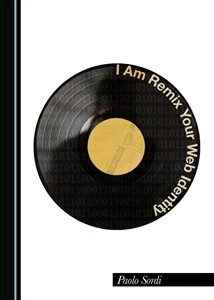
On the ethos of digital presence: I participated today in a panel launching the Italian version of Paolo Sordi’s book I Am: Remix Your Web Identity. (The Italian title is Bloggo Con WordPress Dunque Sono.) The panel included people like Domenico Fiormonte, Luisa Capelli, Daniela Guardamangna, Raul Mordenti, and, of course, Paolo Sordi.
Sordi is a docent in the interdisciplinary MA in Science dell’Informazione della Comunicazione, e dell’Editoria (Information, Communication and Publishing Studies). He teaches web design and management and has written a very nice book that introduces web site development through the creation of a web identity using WordPress. Usually when we introduce a field like the digital we take a historical or computing trajectory. His book starts with a refreshing chapter on how we create and manage our identity online, especially through social media. He then surveys the history of the web through the lens of managing a personal web site which then leads to “WordPress as an Identity Management System.” In the second half of the book he then teaches the reader how to set up a site using WordPress, how to edit the PhP, how to edit stylesheets and so on, all in order to control your personal presence. His own web site is the example he returns to.
What I find intriguing is that through the lens of an ethos of digital presence he manages to introduce a lot of the themes we would want in an introductory digital humanities course. There is a gentle introduction to technical issues like content management systems, databases, and editing code. There is history of the web and Web 2.0. There are reflections on control over data when you outsource your presence to the cloud and commercial services. There are reflections on modularity and lego remix identity that lead to questions about the remixing of truthiness. He also touches on important theorists from Manovich to O’Gorman.
It strikes me that this book comes from years of experience teaching web design. I suspect he found that students were far more interested in learning to use stylesheets, templates, edit code and think theoretically when it was their online identity that was at stake.
I wonder therefore if one could do something similar with gaming as in “I play online, therefore I am.” One could introduce ideas about virtual reality through online games. One could teach coding through Second Life (if anyone plays there any more) and identity management though a tribal wiki.
The panel saw a series of short interventions by us. Carmela Morabito, the Director of the MA introduced the session and some of the themes. Domenico Fiormonte talked about how the book is in many way s a work of digital humanities (informatica humanistica.) It was born from discussions among a Rome informatics group that had studies under people like Tito Orlandi. Fiormonte also talked about how the book had to come out in English translation first before being picked up by an Italian author. He complained about the unfairness of the bias in Italy against Italian texts.
Fiormonte made a point I think important – that this book is one of digital humanities because it brings theory/criticism together with praxis. You start with discussion about identity on the web and then get hands-on instruction on how to manage your own identity. This yacking and then hacking is in the best traditions of the digital humanities. In this context Fiormonte also talked about literacy and how the book helps one become digitally literate.
At a certain point we had an argument over whether digital identity is really so important. What is our digital identity and is it really so important to us? Fabio Ciotti challenged us to be realistic. Despite all our talk about the evils of the big countries we still end up using Facebook and Google.
Perhaps one way to think about it is the issue of control (the return of cybernetics or dysto-cybernetics) . Our identity always in relation to others, what is changing is how we manage our identity towards certain agents. In many ways our identity is the same as it always was; it is only in certain cases that we have to change how we manage ourselves.
Tito Orlando fulminated that he hopes that what we talked about was not in the book. He felt we were putting too much into the site, by which he meant the web. He felt there was a lot more complexity and diversity to the technologies. The web has lots of differences – it isn’t one thing.
It was a testimony to the issues raised by the book that it sparked such a lively conversation.